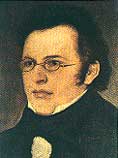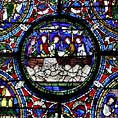The Bible and Aesthetics
Although
at face value the Bible is full of aesthetics, e.g. the Psalms and Proverbs, the
descriptions of the ark of the covenant and procedural requirements of liturgy - all contained in the first 5 books,
it is how we regard the Bible today which is the real aesthetic question. Is it, indeed, the immutable and factual
word of God on which to base a rather exclusive faith (which tends to be the view of Christianity), or should it be
regarded, as I do, that it is a constantly evolving thought process of how we should view that which created the
universe?
Evolution is an undeniable continuing force of the universe. Everything
is subject to it. How then should evolution impact on our aesthetic view of the Bible, i.e. how truthful
and universally relevant to all humanity does the Bible continue to be in the light of the subsequent history of
humanity, its cultural development, its scientific discoveries, and its psychological understandings? Can this
historical document speak to all in the same way as the music of Bach, the works of Leonardo da Vinci, the cathedral
of Chartres, all of which speak across the generations and cultural divides, and are as relevant and uplifting now
as ever they were?
The Bible spans the period roughly between 2000 BCE and 100
CE (i.e. from the Bronze Age to the modern historical period). The aesthetic truth is it is a complex,
wonderful and evolutionary document of the growing awareness of humanity about its relationship with God wrought in
the Bronze and Iron Age by slavery, war, and peace, and the growth of their concept through their interaction with
the religious ideas from the areas in which they lived, Babylon, Egypt, Canaan, Syria and Persia. It charts the
history of the concept of God from that of a capricious multiplicity of national deities to that of a universal
moral God. This concept was continuously evolving but essentially limited because it was seen through the eyes of
those who wrote it, members of the Jewish nation.
The whole of the Hebrew Bible is,
indeed, fraught with danger to religious development, and more especially peace, if we take the stories
at face value and regarding them as valid now as they were when written. For example the God of Moses and Joshua
(roughly 1400BCE), was no more than that of a local deity, warlike and fighting for supremacy, in this case by
helping his tribe, the Hebrews, to establish their own identity by conquest of the people and gods of Canaan. This
view of a god who favoured only one group of people was ultimately to give us the problem we face today of conflict
between Israel and the Palestinians. Who owns the land - the conquerors or the original indigenous tribes? Religion
is still fighting the wars of the Hebrew Bible because it has not evolved. Moreover stories about the actions of
this god are still read aloud in churches today as if this is the model which people still think of as the God in
which Jesus believed.
The God described in the later sections of Isaiah (ca.
550BCE) is so much different but yet one misinterpreted by Christianity. On the one hand it is a real
evolution of belief wrought by the Jews being conquered and taken into exile by the Babylonians in 586 BCE, and
having time to reflect on past history, especially the destruction of Jerusalem and their Temple. Here we have ideas
of justice coming throughout the world, the moral rewards and punishments of the righteous and sinners, and the
first clear statement of monotheism, "I am the first and the last: beside me there is no god"
(Isaiah 44:6). This model of God became the defining model for not only post exilic Judaism, but also for
Christianity and Islam. More controversially it spoke of ideas of a Messiah and a suffering servant. This has been
variously interpreted to mean either Cyrus (iwho overthrew the Babylonians and allowed the Jews to return from their
exile in Babylon), or the Jewish nation, or the remnant of the Jews who returned after the exile in Babylon. It is a
confused picture with no agreed determination. Alone of all the religions which revere the Bible Christianity
insists that there is no confusion, but that these references to a Messiah and servant must be that of Jesus.
Consequently it is difficult, if not impossible, to draw any conclusions as to the
applicability of the Hebrew Bible to the New Testament, apart from to say that from a Christian
perspective it develops on, with Jesus, the concept of a loving god available to all people. What we cannot do, as
so often happens in churches, is to read out passages of the Hebrew Bible, without explanation, as though they were
as relevant now as then, or as they are so often ended, "this is the word of the Lord".
When we move to the New Testament, we move into a modern mine field. For example
think of the birth narratives in Matthew and Luke. They are full of inaccuracies. Matthew states that Jesus was born
of a virgin. Questionable (original word was that for a young woman). Luke states that the birth took place in
Bethlehem at 0 CE when Quirinius was governor of Syria who had commissioned the census (the actual date of the
census was 6/7 CE with nobody allowed to move to their original place of birth - otherwise chaos). The birth also
occurred during the time of Herod the Great (him of the wise men and the slaughter of the innocents). He actually
died in 4BCE. Think of the ox, the ass and the stable - not there in any of the gospels and yet we trot them out
every Christmas. Theologians have known about these problems for decades and yet the truth is never allowed to enter
the public consciousness.
When we consider Paul and the fact that he was the most
influential figure in establishing the Christian church I am reminded of a comment by Gandhi, "I
like your Christ, I do not like your Christians. Your Christians are so unlike your Christ". Paul was a
pharisee, a group well known for interpreting the Hebrew Bible in idiosyncratic ways and then treating their
interpretations as truth. He was to return Christianity back into a left hemisphere religion of narrow legalistic
interpretation, only shortly after Jesus had accomplished the opposite. For example Paul it was who subverted the
original story of Adam and Eve into his own personal theology. He believed that the death of Jesus on the cross was
as a sacrifice for the sins of the whole world and the means of reconciliation between humanity and God. For this to
have meaning there must first be an alienation between humanity and God. The major problem is that there was, and
still is in Judaism no concept that Adam eating an apple alienated humanity from God. In the historical reality of
the Bible God still continued to influence humanity through Moses and the commandments, David and Samuel and the
rise of the state of Israel, and indeed all the prophets. Should we regard the story of Adam and Eve as bringing sin
and death into the world, or should we regard it as a variation of an ancient Babylonian myth more concerned with
the transition of humanity from hunter gatherer to agriculture and the heavy work this involved.
Thanks also to Paul we also have the contentious problems of the words used in the
eucharist/mass/holy communion, acknowledgement of slavery, salvation through grace rather than effort, and the
separate qualities of the female (since it was Eve who tempted Adam thereby bringing sin into the world). He was in
print first, some 30 years before any of the gospels appeared, and his theology has tended to hold sway in the
Christian church, giving it a narrow legalised quality, rather than the holistic message of Jesus, that of loving
god and your fellow human beings, with change of mind and lifestyle to accomplish this. Thanks also to him we have
the origins of the 'second coming' when Jesus will come again to wrap up the world order. In fact Paul got this so
wrong (he thought originally that Jesus would appear during his life) that when nothing happened he had to issue
instructions that people (who, believing his origin message, were sat around doing nothing) were to get on with
life. It was not for them to know when the event would take place.
The overarching
effect of all this was to move Christianity from the simple but profound right hemisphere controlled message of
Jesus of getting the self in order no matter what you believed (which in reality needs effort, reflection
and the union of both hemispheres to accomplish) into a left hemisphere, time orientated quasi legal set of
instructions.
Consequently Religion needs to refocus on letting in all the truth
and doubt which is out there. It would be relatively easy to achieve. For example, it is relatively easy
to challenge the views by use of the Internet, which in its more balanced presentations, such as Wikipedia,
identifies all problems and current thinking in the Bible narratives from a left brain perspective of many of those
religions which draw on the Bible for sustenance. For me it is wrong not to present the problems on the grounds that
the faithful are either not interested or could not cope. Anyone who can drive, or fill in a tax return, navigate
their way through plane/train/bus timetables, find their way round a supermarket, or operate the remote on a TV,
possesses the necessary skills! What they do need positive help in is living more universal lives which accepts the
differences of other religions, and in accepting this, going on to developing their own aesthetic approach to life
by being more creative within their own religion.



